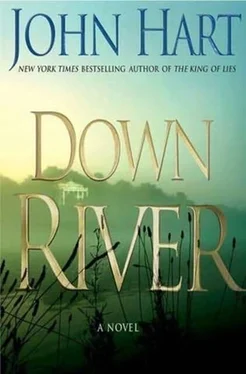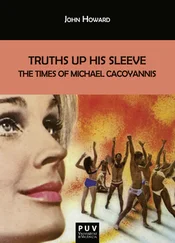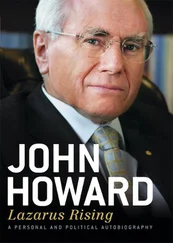I asked the biggest question, although I knew that there was no simple answer. “Why, Miriam?”
“It takes away the pain.”
I wanted to understand. “What pain?”
She looked at the gravestone, caressed the hard-edged letters of Gray Wilson’s name. “I really loved him,” she said.
The words caught me off guard. “Are you serious?”
“It was a secret.”
“I thought you were just friends. Everybody thought that.”
She shook her head. “We loved each other.”
My mouth opened.
“He was going to marry me.”
Miriam had never been what my father thought she should be; she was right about that. She was beautiful in a pale and subdued way, but so reticent at times that one might easily forget that she was in the room. She’d been like that from the earliest days: sensitive and small, easily lost in the shadows. The rest of us were too outgoing perhaps. Maybe her mother wasn’t the only one who’d smothered Miriam. Maybe it had been a group effort, unintentional but cruelly effective. And I knew how weakness could compound over time. When she was twelve, some girls at school had been unkind to her. We never learned what the unkindness had been, something typical of girls that age, I’d always imagined. Whatever the slight, she’d gone three weeks without speaking to anyone. My father had been patient at first, then grown frustrated. There was an explosion near the end, harsh words not easily forgotten. She had cried and fled the room, and his apologies, later that night, had been to no avail.
He’d felt horrible about it, but dealing with women had never been his strong suit. He was gruff, spoke his mind when he spoke at all; and there was no place for delicacy in the man. Miriam was too young to understand that. She withdrew further over subsequent years, built the wall higher, salted the ground around her. She confided in her mother, and in Jamie, perhaps. But not in my father, and certainly not in me. It was a small sadness that began easily and grew until we barely noticed it.
Miriam was just quiet. That’s how she was.
The relationship with Gray Wilson must have been as precious to her as the memory of sunset to a blinded man. I could understand why she’d have feelings for the kid; he was loquacious and bold, everything that Miriam was not. And I could certainly surmise why they’d kept it a secret. My father would not have approved; Janice, either. Miriam had just turned eighteen when Gray was killed. She was about to start Harvard, and he was in his third month of work at the truck plant one county over. But I could see how the two of them might be together. He was easy and likable, handsome in a thick-boned way. And it could be true, what was said about opposites. He was large and raw and poor; she was small and delicate and destined for great wealth.
It was a shame, I thought. One of many.
Before I left the cemetery, I asked Miriam if she wanted me to stay with her, but she declined. Sometimes I just want to be alone with him, you know. Alone with the memory.
Neither one of us mentioned George Tallman, but he was out there, big and real and boring as dirt. George had been in love with Miriam since they were young, but she’d never given him the time of day. He’d been lovesick and desperate and sad. So much so that, at times, it had been painful to watch. She’d settled, I saw that now. Alone and destined to be that way, she’d taken the easy route. She would never admit it, not even to herself; but it was fact, like the sky above was fact, and I wondered what George would say if he could see her here, tear-stained and dressed in black, weeping over the grave of a rival five years in the ground.
We parted with an awkward embrace and my promise to keep quiet about what I’d learned. But I was worried. More than that, I was frightened. She was a cutter, so full of pain that it took her own blood to wash it away. How did it work, I wondered. A cut an hour? Two a day? Or did they come without pattern, a quick slice when life reared its ugly head? Miriam was weak, as fragile and liable to drop as any of the petals she’d laid on his grave. I doubted that she had the resources to deal with the problem, and wondered if Janice had the requisite commitment. She’d kept it from my father. Was that to protect Miriam or for some other reason? I asked myself one more question, asked because I had to.
Could I keep my promise to stay quiet?
As I drove away, left her alone, I felt a powerful urge to visit Grace. It was not a conscious matter, but one of feeling. They were so different, the two of them. Raised on the same property by two men who could have been brothers, they could not be more opposite. Miriam was as cool and quiet as March rain; Grace had the raw force of August heat.
But I decided against a visit. There was too much to do, and Dolf, for the moment, needed me more. So I drove past the hospital and continued farther into town. I parked in the lot of the Rowan County Municipal Building and took the stairs to the second floor. Grantham thought he had a motive. I needed to take a look at that.
The tax assessor’s office was to the right.
I entered through a glass door. A long counter ran the width of the reception area; seven women occupied the space behind it. None of them paid me the slightest bit of attention as I consulted the huge map of Rowan County that was posted on the wall. I found the Yadkin River and traced it until my finger touched the long bend that contained Red Water Farm. I found the right reference number, went to the smaller maps, and pulled the one I needed. I spread it out on one of the large tables. I expected to see a single fourteen hundred and fifteen acre parcel with my father’s name on it. That’s not what I saw.
The farm was delineated on the map: Jacob Alan Chase Family Limited Partnership. Twelve hundred and fifteen acres.
The southern piece of the farm had been carved away, a rough triangle with one long side of curving river. Adolfus Boone Shepherd. Two hundred acres.
Robin was right. Dolf owned two hundred acres, including the house.
Six million dollars, she’d said. Based on the latest offer.
What the hell?
I copied the deed book and page numbers onto a piece of scrap paper and replaced the map on its rack. I went to the counter, spoke to a woman. She was middle-aged and round. Thick blue powder rimmed the hollow space beneath her eyebrows. “I’d like to see the deed for this parcel of land,” I said, and slipped the scrap of paper onto the counter between us. She did not even bother to look down.
“You need the Register of Deeds, sugar.”
I thanked her, went to the Register of Deeds office, and spoke to another woman behind another counter. I gave her the numbers and told her what I wanted. She pointed to the end of the counter. “Down there,” she said. “It’ll take a minute.”
When she reappeared, she had a large book under her arm. She dropped it onto the counter, slipped a thick finger between two pages, and opened the book. She thumbed pages until she found the right one, then spun the book to face me. “Is that what you want?” she asked.
It was a deed of transfer dated eighteen years ago. I skimmed the language; it was straightforward. My father had transferred two hundred acres to Dolf.
“That’s interesting,” the woman said.
“What?”
She put the same thick finger on the deed. “No tax stamps,” she said.
“What do you mean?”
She huffed, as if the question weighed heavily on her. Then she flipped back a few pages to another deed. On the top corner was affixed a number of colored stamps. She pointed. “Tax stamps,” she said. “When land is purchased a tax is paid. The stamps go on the deed.” She flipped back to the deed that transferred two hundred acres of Chase land to Dolf Shepherd. She put her finger on the corner. “No stamps,” she said.
Читать дальше












